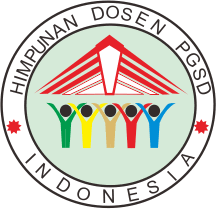Hubungan self-efficacy dengan kemampuan pemecahan masalah mata pelajaran ipas kelas v sekolah dasar di kecamatan banjarsari
Abstract
Self-efficacy is the belief of every human being in their ability to plan and carry out actions to reach goals. Problem solving ability is the activity of solving problems in the context of learning by using available information sources. Study goals’s to examine the relationship between self-efficacy and problem solving ability. Type of research is quantitative research using correlation analysis test techniques. The population of this study were elementary school students in Banjarsari District. The sample size was 200 students. Stratified-cluster random sampling is the sampling. Tests and questionnaires were the data collection techniques used. In the data analysis, a correlation analysis test was conducted. It was found that the correlation value r = 0.975 means that there is a very strong relationship between self-efficacy and problem-solving ability.
Keywords
Full Text:
PDFReferences
[1] N. Azizah, Y. Baptista, and C. Aprinastuti, “Penerapan Pembelajaran Ipa Berbasis Computational Thinking Materi Siklus Air Kelas V Sekolah Dasar,” Prima Magistra: Jurnal Ilmiah Kependidikan, vol. 4, no. 3, pp. 269–282, Jun. 2023, doi: 10.37478/jpm.v4i3.2655.
[2] E. I. Nurjanah and R. Ardiansyah, “Studi hubungan self-efficacy terhadap hasil belajar kognitif pada mahasiswa PGSD Surakarta UNS,” Didaktika Dwija Indria. 2023.
[3] W. Arsyabinta, R. Winarni, and A. Surya, “Analisis kesulitan pemecahan masalah matematika berdasarkan teori Polya pada peserta didik kelas IV sekolah dasar,” Didaktika Dwija Indria. 2023.
[4] F. Oktarisa and N. Purnama, “Kemampuan Pemecahan Masalah Matematis Siswa Pada Materi Spltv Berdasarkan Tahapan Polya,” KOLONI, 1(4), 2022.
[5] R. Purwantini, T. Prasetyo, and A. Mawardini, “Pengaruh Model Pembelajaran Advance Organizer Terhadap Kemampuan Pemecahan Masalah Pada Mata Pelajaran IPAS Kelas V Di Sekolah Dasar,” Jurnal Pengajaran Sekolah Dasar, vol. 3, no. 1, pp. 1–14, Jun. 2024, doi: 10.56855/jpsd.v3i1.1004.
[6] A. A. Putri and D. Juandi, “Kemampuan Pemecahan Masalah Matematis Ditinjau dari Self Efficacy: Systematic Literature Review (SLR) di Indonesia,” Symmetry: Pasundan Journal of Research in Mathematics Learning and Education, vol. 7, no. 2, pp. 135–147, Dec. 2022, doi: 10.23969/symmetry.v7i2.6493.
[7] A. Imaroh et al., “Analisis Kemampuan Pemecahan Masalah Matematika Ditinjau Dari Self-Efficacy Siswa Pada Materi Sistem Persamaan Linear Tiga Variabel,” Jurnal Pembelajaran Matematika Inovatif, vol. 4, no. 4, 2021, doi: 10.22460/jpmi.v4i4.843-856.
[8] O. : Fauziana, “Pengaruh Self Efficacy Terhadap Kemampuan Memecahkan Masalah Ipa,” Pionir: Jurnal pendidikan, vol. 11, p, 2022.
[9] M. F. Amar and R. Simorangkir, “Peran Kemampuan Komunikasi Interpersonal Pendidik Dalam Menumbuhkan Self-Efficacy,” Aafiyah: Jurnal Multidisiplin Ilmu, 2024.
[10] M. Jiang and J. Ballenger, “Nontraditional Doctoral Students’ Perceptions Of Instructional Strategies Used To Enhance Statistics Self-Efficacy In Online Learning,” Journal of Educators Online. 2023.
[11] K. O. Byrd and R. M. Giles, “Preservice Teachers’ Self-Efficacy for Teaching Mathematics,” Southeastern Regional Association of Teacher Educators (SRATE) Journal. 2023.
[12] D. P. Sari, Y. Yana, and A. Wulandari, “Pengaruh Self-efficacy dan Motivasi Belajar terhadap Hasil Belajar Matematika Peserta didik MTs Al-Khairiyah Mampang Prapatan di Masa Pandemi COVID-19,” Jurnal Cendekia : Jurnal Pendidikan Matematika, vol. 13, no. 1, pp. 1–11, Oct. 2021, doi: 10.31004/cendekia.v6i3.1423.
[13] S. Vega Artinta, H. N. Fauziyah, and R. Artikel, “Faktor yang Mempengaruhi Rasa Ingin Tahu dan Kemampuan Memecahkan Masalah Siswa pada Mata Pelajaran IPA SMP Info Artikel ABSTRAK,” Jurnal Tadris IPA Indonesia, vol. 1, pp. 210–218, 2021, [Online]. Available: http://ejournal.iainponorogo.ac.id/index.php/jtii
[14] S. Septhiani, “Analisis Hubungan Self-Efficacy Terhadap Kemampuan Pemecahan Masalah Matematika,” Jurnal Cendekia : Jurnal Pendidikan Matematika, vol. 6, no. 3, pp. 3078–3086, Oct. 2022, doi: 10.31004/cendekia.v6i3.1423.
[15] F. , H. J. S. , & S. D. P. Amaliyah, “Pengaruh Self-efficacy Terhadap Kemampuan Pemecahan Masalah Matematis Peserta didik Sekolah Dasar,” Pendas: Jurnal Ilmiah Pendidikan Dasar, vol. 8, pp. 5482–5490, 2023.
[16] A. Marddiyah, “Pengaruh Self Efficacy Terhadap Hasil Belajar Ipa Peserta Didik Kelas Vi Min 14 Al-Azhar Asy-Syarif Indonesia Skripsi,” 2022.
[17] D. Damianti and E. A. Afriansyah, “Analisis Kemampuan Pemecahan Masalah Matematis Dan Self-Efficacy Siswa Smp,” Jurnal Inovasi Pendidikan dan Pembelajaran Matematika, vol. 8, no. 1, 2022.Refbacks
- There are currently no refbacks.



